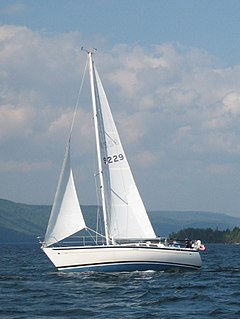The Pearson Triton, sometimes referred to as a Triton 28, is an American sailboat that was designed by Carl Alberg as a racer-cruiser and first built in 1958. It was introduced at the 1959 National Boat Show in New York City and was one of the first fiberglass boat designs built. The design also launched Alberg's career as a naval architect.

The C&C 35, also called the Redwing 35, is a Canadian sailboat, that was designed by Cuthbertson & Cassian and first built in 1969.

The C&C 37/40 is a Canadian 12.05 metres (39.5 ft) LOA fibreglass monohull sailing yacht, designed in 1988 by Robert W. Ball of Cuthbertson & Cassian as a replacement for the earlier C&C 37 dating from 1981. The C&C 37/40 is a recreational keelboat of moderate displacement, intended as a cruiser/racer or oceangoing racer. The yachts have a masthead sloop rig, with a fin keel and an internally-mounted spade-type rudder. Over 110 of the 37/40 type were built before the Canadian plant closed in 1994. The design is no longer produced.

The Chance 32/28 is a Canadian and French sailboat, that was designed by Naval Architect Britton Chance Jr. and first built in 1972.
The Hunter Passage 450 is an American sailboat that was designed by the Hunter Design Team as a cruiser and first built in 1996.
The Cape Dory 22 is an American sailboat that was designed by Carl Alberg as a cruiser and first built in 1981.
The Columbia 32 is an American sailboat that was designed by William H. Tripp Jr. and first built in 1975.
The Watkins 36, also known as the W36 and W36AC, is an American sailboat that was designed by William H. Tripp Jr and the Watkins brothers, first built in 1981.
The Watkins 36C, also known as the W36C, is an American sailboat that was designed by William H. Tripp Jr and the Watkins brothers. It was first built in 1981.
The Watkins 29, also known as the W29, is an American sailboat that was designed by Walter Scott in conjunction with the Watkins brothers and first built in 1984.
The Watkins 25, also known as the W25 and marketed as the Seawolf 25 from 1986, is an American trailerable sailboat that was designed by the Watkins Design Team and first built in 1983.
The Freedom 35 is an American sailboat that was designed by David Pedrick as a racer/cruiser and first built in 1993.
The Baltic 40 is a Finnish sailboat that was designed by Judel/Vrolijk & Co. as an International Offshore Rule racer-cruiser and first built in 1988.
The Nordic 44 is an American sailboat that was designed by Robert Perry as a racer-cruiser and first built in 1980.

The Beneteau 331 is a French sailboat that was designed by Group Finot/Conq for cruising and first built in 1999.
The Dehler 25 is a German trailerable sailboat that was designed by E. G. van de Stadt as a cruiser and first built in 1984.
The Ericson 25+, also called the Ericson 25 Mark II, is an American trailerable sailboat that was designed by Bruce King as a cruiser and first built in 1978.
The S2 35 is an American sailboat that was designed by Graham & Schlageter as a cruiser. The design is also referred to as the S2 35C for "center cockpit", although there was no other configuration model built. At its introduction in 1986, S2 Yachts marketed the boat as the S2 35 Mid Cockpit.
The Seafarer 22 is an American trailerable sailboat that was designed by McCurdy & Rhodes as a cruiser and first built in 1976.
The Seafarer 34 is an American sailboat that was designed by McCurdy & Rhodes as a cruiser and first built in 1972.




